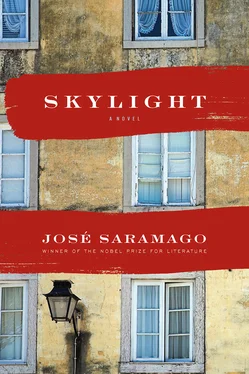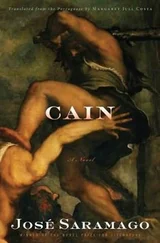“Juliet saw Romeo,” thought Abel. “What will happen next?” He jumped down from the wall and walked into the middle of the yard. Lídia was still at the window. “Now it’s my turn to say: ‘But, soft! what light through yonder window breaks? It is the east, and Juliet is the sun.’”
“Good evening,” said Abel, smiling.
There was a pause, then he heard Lídia’s voice say “Good evening” and she promptly vanished. Abel threw down his cigarette and, much amused, mumbled to himself as he returned to his room:
“There’s an ending Shakespeare didn’t think of.”
Henrique’s condition took an unexpected turn for the worse. The doctor, summoned urgently, ordered tests to be made for diphtheria bacilli. The boy was running a very high fever and was delirious. Carmen, desperate with anxiety, blamed her husband for allowing the illness to get this far. She made a terrible scene. Emílio merely listened and, as usual, said nothing. He knew his wife was right, because she had been the first to think of calling a doctor. He was filled with remorse. He spent the whole of Sunday at his son’s bedside and, on Monday, at the appointed time, rushed off to get the results of the analysis. He breathed a sigh of relief when he saw that it was negative, but the comment on the report that one such test was often not enough plunged him back into despair.
The doctor, however, declared himself satisfied and predicted a rapid recovery — once they had got through the next twenty-four hours. Emílio did not leave his son’s side all that day. Carmen, who had been cold and silent since supper, found her husband’s presence hard to bear. She found it exasperating enough on normal days, but now that her husband refused to leave the room, she felt she was being robbed of the one thing that was most precious to her: her son’s love.
In order to get rid of Emílio, she reminded him that he wasn’t going to earn any money stuck at home, and that they needed the money more than ever, what with the additional expense of Henrique’s illness. Once again Emílio responded only with silence. She was right about that too; he would do more good leaving her to take care of Henrique, but still he did not go. He was convinced now that he was responsible for that relapse, because his son’s condition had only worsened after the night he had spoken to him. His presence there was like a penance, as futile as all penances are, and which only made sense because it was entirely self-imposed.
Despite his wife’s insistence, he did not go to bed at the usual hour. Carmen also stayed up, anxious to demonstrate that she did not love her child any less than he did.
There was little they could do. Once the crisis was over, the illness followed its natural course. The medicines had been administered, and now it was a matter of waiting for them to take effect. But neither of them wanted to give in. It was a kind of standoff, a mute battle. Carmen was struggling to hang on to Henrique’s affection, which she felt she risked losing because of her husband’s caring presence there. Emílio was struggling to quell his feelings of remorse and to make up for his earlier indifference with his present concern. He was aware that his wife’s battle was the worthier one and that in his own battle there was a substratum of egotism. Of course he loved his son: he had engendered him, how could he not love him? Not to do so would be unnatural. However, he knew full well that he was a stranger in that house, that nothing there really belonged to him, even though it had been bought with his money. Having is not the same as owning. You can have even those things you don’t want. Owning means having and enjoying the things you have. He had a home, a wife and a son, but none of them was truly his. He only had himself, but even then not entirely.
Sometimes Emílio wondered if perhaps he was mad, if this life of conflicts, storms and constant misunderstandings was a consequence of some nervous imbalance in him. Away from home, he was, or thought he was, a normal creature capable of laughing and smiling like everyone else, but he only had to cross the threshold of their apartment for an unbearable weight to fall on him. He felt like a drowning man who fills his lungs not with the air that would allow him to live, but with the water that is killing him. He felt he had a duty to declare himself satisfied with what life had given him, to acknowledge that other, far less fortunate men managed to live contentedly. This comparison, however, brought him no peace. He didn’t know what would give him peace or where he would find it, or if it even existed. What he did know, after all these years, was that he did not have it. And he knew that he wanted to find it, the way a shipwrecked man desperately wants to find a plank of wood to cling to, the way a seed needs the sun.
These thoughts, repeated over and over, always brought him back to the same point. He compared himself to a mule harnessed to a waterwheel and walking miles and miles, round and round in the same circle, eyes blinkered, not realizing that he is treading the same ground he has trodden a thousand times before. He wasn’t a mule, he wasn’t wearing blinkers, but he had to agree that his thoughts were leading him round and round a well-trodden path. Knowing this only made matters worse, because there he was, a human being behaving like an irrational animal. You can’t blame the mule for submitting to the yoke, but should he be blamed? What was it that kept him tied to the yoke? Habit, cowardice, fear of hurting other people? Habits can be changed, cowardice can be overcome, and other people’s suffering is almost always less than we think. Had he not already proved — or at least tried to prove — that his absence would quickly be forgotten? So why did he stay? What force was it that bound him to that house, that woman, that child? Who had tied those knots?
The only answer he came up with was “I’m tired.” So tired that, even though he knew full well that all the doors of his prison could be opened and that he had the key, he still did not take a single step toward freedom. He had grown so accustomed to feeling tired that he took a certain pleasure in it, the pleasure of someone who has given up, the pleasure of someone who, when the moment of truth arrives, turns back the clock and says: “It’s too early.” The pleasure of self-sacrifice. But sacrifice is only complete when it is kept hidden from view; making it visible is tantamount to saying, “Look at me, look how self-sacrificing I am,” and making sure that other people don’t forget it. Therefore he had not yet given up entirely, and behind his resignation hope still lingered, just as the blue sky is always there behind the clouds.
Carmen was looking at her husband sitting there absorbed in thought. The ashtray was full, and Emílio continued to smoke. One day she had worked out how much money he spent on cigarettes and had criticized him harshly for it. She had told her parents, and they, of course, had sympathized with her. It was like burning money, like throwing it away, money they badly needed. Vices are for the rich, so if you want to have vices, you have to get rich first. Emílio, though, was a commercial traveler for want of any better employment, out of necessity, not out of vocation, and had never shown any desire to get rich. He contented himself with the bare minimum and went no further than that. What a useless man! What a useless life! Carmen belonged to a different race, a race for whom life is not a matter of standing and staring, but of struggling. She was active, he was apathetic. She was all nerves, bones and muscles, all the necessary ingredients for generating power and energy; he was all those things too, but he wrapped his bones, muscles and nerves in a mist of apathy, trammeling them with dissatisfaction and doubt.
Читать дальше












